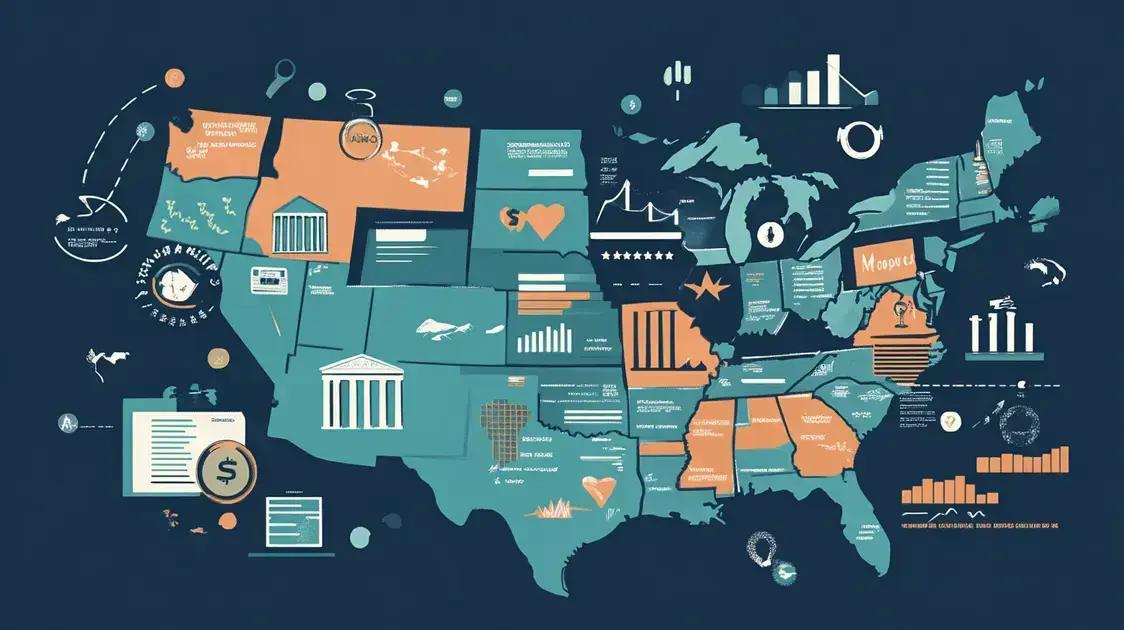Anúncios
Are you looking for effective Tax-saving tips USA? Understanding how to maximize your refund can be a game changer!
In this article, we will delve into various strategies, including deductions and credits, that can substantially improve your financial situation during tax season.
With simple adjustments and smart planning, you can unlock benefits that might be overlooked.
Anúncios
Understanding Tax Deductions and Credits
Understanding tax deductions and credits is important for anyone looking to save money during tax season. Tax deductions reduce your taxable income, which means you pay less in taxes.
For example, if you have a deductible expense of $1,000 and your tax rate is 20%, you save $200 in taxes. Knowing what expenses you can deduct makes a big difference!
On the other hand, tax credits directly reduce your tax bill. For instance, if you owe $1,000 in taxes and qualify for a $200 tax credit, you only pay $800.
There are different types of credits, such as those for education or for having children. Finding out which credits you can claim can lead to significant savings.
Anúncios
The best strategy is to keep track of all your expenses throughout the year. Organizing your receipts and understanding which items qualify for deductions and credits can help you maximize your refund.
Knowing the rules around deductions and credits ensures you’re not leaving money on the table!
Maximizing Retirement Contributions
Maximizing retirement contributions is a smart way to save for your future while also saving on taxes today. When you contribute to a retirement account, like a 401(k) or an IRA, you can often deduct these contributions from your taxable income.
This lowers your tax bill now and helps you build a safety net for later. It’s a win-win situation!
Many employers offer matching contributions. If your employer matches up to a certain percentage of your retirement savings, make sure to contribute at least that amount.
This is free money that helps your savings grow faster. Not taking advantage of the match is like leaving money on the table.
Furthermore, consider increasing your contributions each year or following a raise. Even a small increase can add up significantly over time.
It’s a great habit to get into as it sets you up for a comfortable retirement. Starting early and contributing regularly is key to maximizing your retirement funds.
Utilizing Health Savings Accounts

Utilizing Health Savings Accounts (HSAs) can be a smart way to save money on healthcare costs while maximizing your tax benefits. HSAs allow you to put money aside for qualified medical expenses, and contributions are tax-deductible.
This means you can reduce your taxable income while also preparing for future medical bills. It’s important to know that funds in your HSA roll over each year, so you don’t lose them.
Another great benefit of HSAs is that withdrawals for qualified medical expenses are tax-free.
This means that when you use your HSA funds for things like doctor visits, medication, or other approved healthcare needs, you won’t pay taxes on that money. This feature makes HSAs a powerful tool for managing healthcare costs effectively.
Moreover, HSAs can be used as a long-term savings plan for healthcare in retirement. The money can grow tax-free over time, similar to a retirement account.
If you keep contributing to your HSA, you may have a nice nest egg saved for any healthcare expenses that arise later in life. This makes HSAs not just a current tax-saving strategy but also a smart move for the future.
Tax Benefits for Homeowners
Homeowners can enjoy several tax benefits that can help make owning a home more affordable. One of the biggest advantages is the ability to deduct mortgage interest from your taxable income.
This means that the money you pay in interest on your home loan can reduce the amount of tax you owe, providing significant savings each year.
Additionally, property taxes are another deductible expense for homeowners. This allows you to deduct the amount you pay in local property taxes from your taxable income as well.
These deductions can really add up, especially in areas where property taxes are high, giving you more financial room to budget for other expenses.
Another important benefit is the exclusion on capital gains when you sell your home. If you meet the requirements, you could exclude up to $250,000 in gains from your taxes if you are single, and up to $500,000 if you are married.
This is a great incentive to invest in property as it helps you keep more of your profits when it’s time to move.
Tax-Saving Tips USA: Claiming Education Expenses
Claiming education expenses is a great way to save money on your taxes while investing in your future. If you are a student or the parent of one, you may qualify for tax credits like the American Opportunity Credit or the Lifetime Learning Credit.
These credits help reduce the amount of taxes you owe based on your education costs, such as tuition, fees, and even some course materials.
In addition to credits, you can also claim deductions for student loan interest. If you are repaying student loans, you can deduct up to $2,500 in interest payments from your taxable income.
This deduction can help ease the financial burden of paying off loans and make your overall tax situation better.
It’s important to keep track of all your education-related expenses throughout the year. Save your receipts and document everything for easy reference when it’s time to file your taxes.
By being organized and informed, you can take full advantage of the benefits available to you, ensuring that you maximize your tax savings related to education.
State-Specific Tax Strategies

When it comes to taxes, every state has its own rules and strategies that can affect how much you owe or how much you can save. Some states offer tax credits for homeowners or seniors that may not be available in others.
It’s important to research these state-specific benefits to ensure you take advantage of all the opportunities in your area. Knowing what’s available can lead to significant savings.
Additionally, different states have varying tax rates and exemptions. For instance, some states do not charge income tax at all, while others might provide credits for certain expenditures.
Understanding your state’s tax landscape can help you make better financial decisions, like where to live or how much to save for retirement.
Lastly, it’s advisable to consult with a tax professional who knows your state’s laws. They can provide personalized advice to help you maximize your tax refund through state-specific strategies. Investing time in understanding your state’s rules can pay off significantly come tax season.





